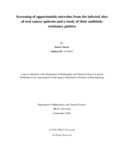Screening of opportunistic microbes from the infected sites of oral cancer patients and a study of their antibiotic resistance pattern

View/Open
Date
2020-09-03Publisher
Brac UniversityAuthor
Nawar, ZareenMetadata
Show full item recordAbstract
Cancer is one of the most lethal diseases in the world. It can be defined as the uncontrolled growth of cells that can spread throughout the body. Oral cancer is one of the most common cancers in South-Asian countries. Worldwide it is the 6th most prevalent cancer. The immune-comprised patients after the treatment of oral cancer may have a chance of infection by drug-resistant opportunistic microbes. In this study, opportunistic microbes were identified and isolated from the oral cancer patient with infection and their resistance profile with the common antibiotics used was determined. Oral swab samples from 55 oral cancer patients were taken to check the presence of the opportunistic organisms. Of them 24 had a post-operative infection, 31 had a pre-operative infection. So, a higher number of infections were found in pre-operative patients. On the other hand, swab samples were also taken from 50 healthy people (control). After screening from the patient group, 83(65.4%) of the organism were gram-negative bacteria and 44(34.6%) were grampositive bacteria. Again, among the isolates from the patient group, the most prevalent organism was Pseudomonas spp 30(54.54%) followed by Klebsiella spp 27(49.09%), Staphylococcus spp 24(43.63%), E. coli 14(25.45%), Streptococcus spp 14(25.45%), Proteus spp 12(21.8%). The least prevalent was Enterococcus spp 6(10.9%). The isolates were all taken for antibiotic sensitivity testing (AST) against 13 antibiotics from 11 different groups used in hospitals. It was observed gram-positive isolates of the patient group exhibited 100% resistance to antibiotic metronidazole, erythromycin, oxacillin, cloxacillin, and amoxicillin. The resistance of these gram-negative organisms was followed in nalidixic acid with 95.5% resistance and ceftazidime with 90.9% resistance. Gram-positive organisms isolated from oral cancer patients didn’t show any resistance towards the antibiotic imipenem. The gram-negative isolates exhibited 100% resistance to metronidazole, vancomycin, amoxicillin, penicillin. The resistance of these organisms was followed in azithromycin with 92.9% resistance, nalidixic acid with 89.3% resistance, tetracycline with 88.1% resistance, and amoxyclav with 81% resistance. The gram-negative isolates showed 16.7% resistance to imipenem, 7.1% to amikacin, and minimum resistance of 2.4% to gentamicin. Both gram-positive and gram-negative isolates of the patient group exhibited high resistance to metronidazole, nalidixic acid, amoxicillin. The least resistance was seen against amikacin, gentamicin, imipenem, and ciprofloxacin. In contrast, the microbes of the control group showed less resistance to these antibiotics and rather showed sensitivity to them. Thus, the isolates of the control group were less harmful than those from cancer patients.
